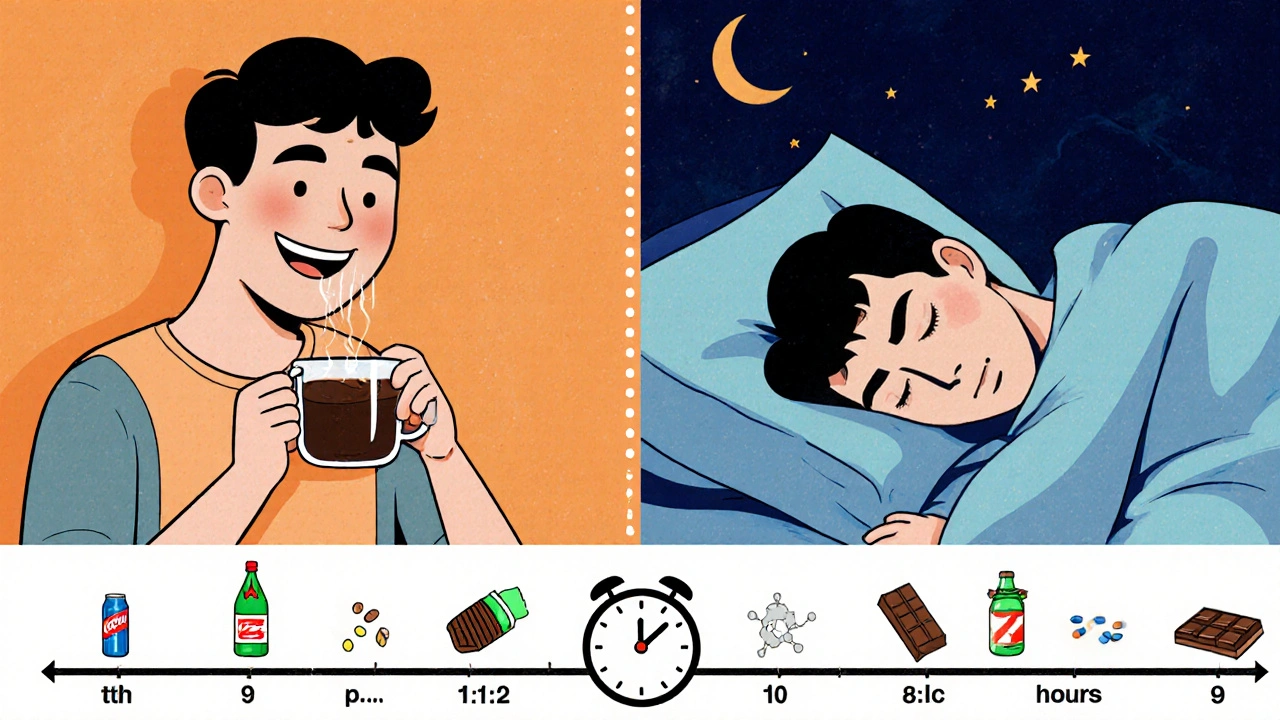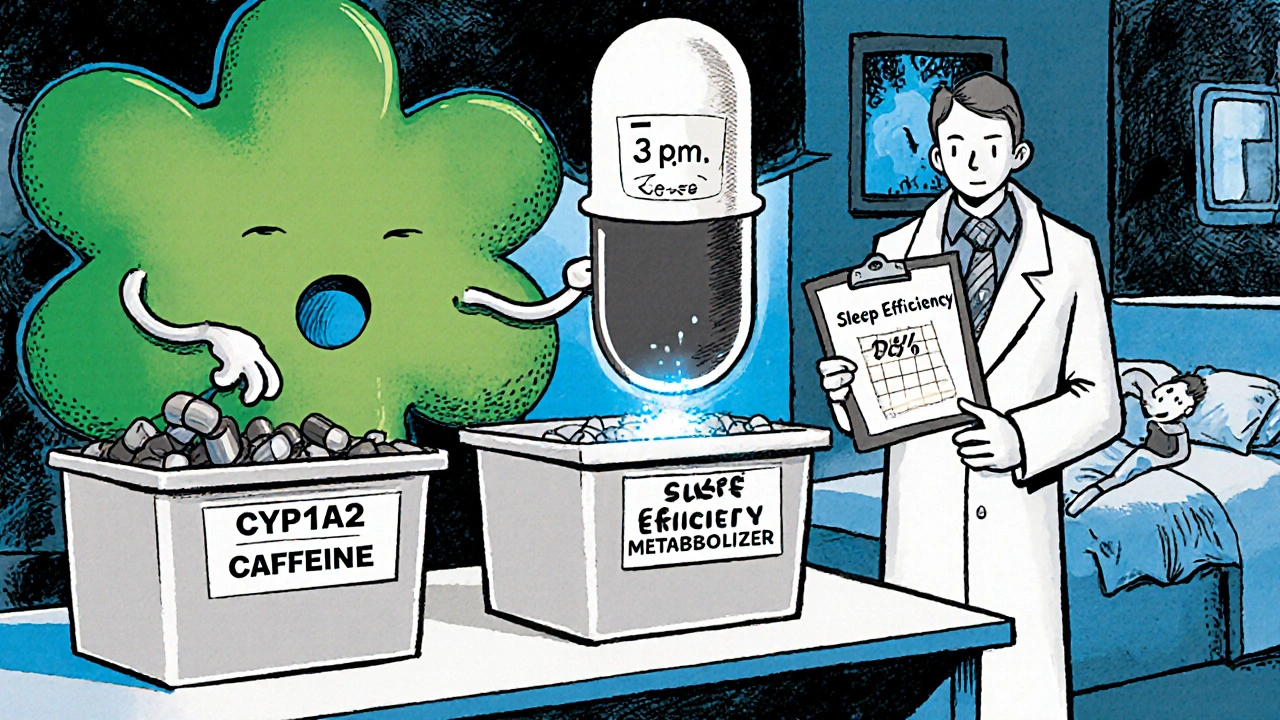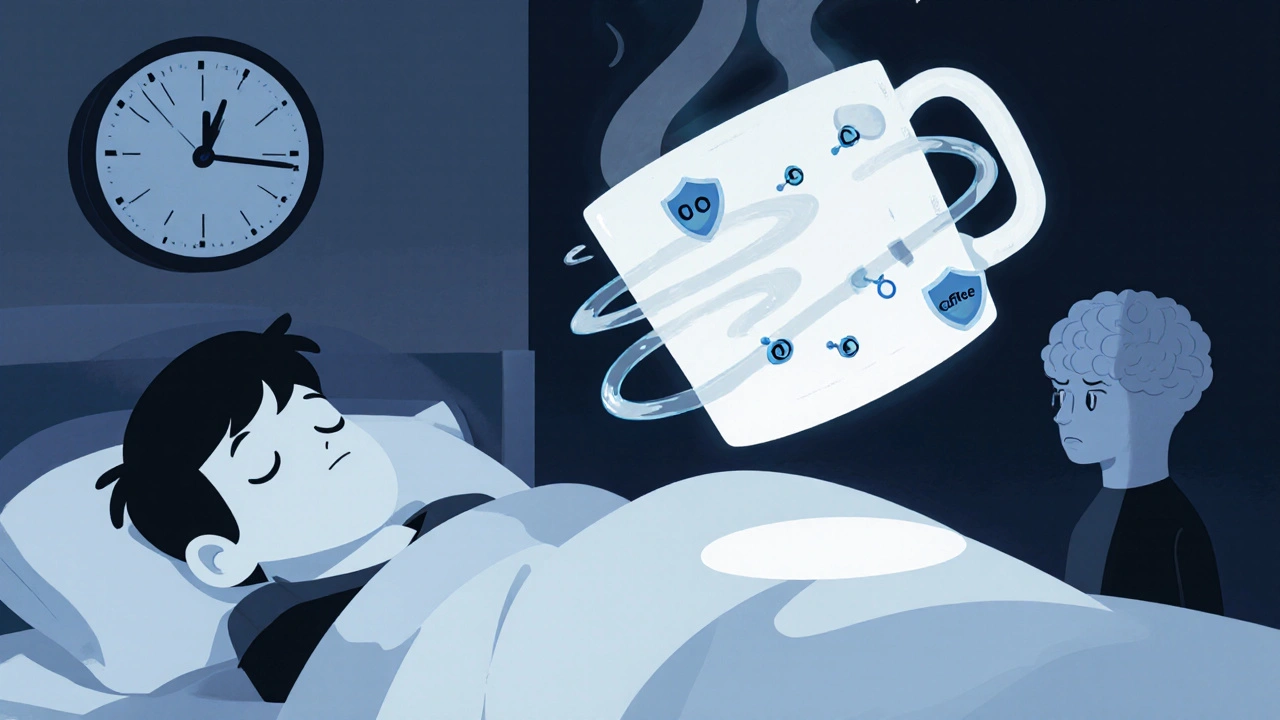How many times have you laid in bed at night, wide awake, wondering why you can’t fall asleep-even though you’re exhausted? If you’ve had a coffee after 2 p.m., that’s probably why. Caffeine doesn’t just give you a buzz; it lingers in your system long after you’ve finished your cup. And if you’re still drinking it close to bedtime, you’re not just delaying sleep-you’re stealing quality rest you didn’t even know you were losing.
Why Caffeine Keeps You Awake (Even If You Think It Doesn’t)
Caffeine doesn’t work by making you jittery. It works by sneaking into your brain and blocking the signals that tell you it’s time to sleep. The molecule looks almost identical to adenosine, a chemical your body builds up throughout the day to make you feel tired. When adenosine binds to its receptors, you feel sleepy. Caffeine steps in, takes the seat, and says, “Not today.” Your brain doesn’t get the message to slow down. So even if you fall asleep, your brain never fully switches into deep, restorative mode. Studies show that drinking caffeine within 6 hours of bedtime can reduce total sleep time by 45 minutes and cut sleep efficiency by 7%. That means more time spent tossing and turning, less time in the deep, healing stages of sleep. And here’s the kicker: 15 out of 18 studies found that caffeine lowers sleep efficiency-even when people didn’t report trouble falling asleep. You might think you’re sleeping fine. But your brain knows the difference.How Long Does Caffeine Really Last?
Most people think caffeine wears off in a few hours. But its half-life-the time it takes for half the caffeine to leave your system-is 4 to 6 hours on average. For some, it’s longer. Much longer. If you have a certain gene variant (CYP1A2), you’re a slow metabolizer. Your body clears caffeine in up to 12 hours. That means a coffee at 3 p.m. is still half-active in your system at 3 a.m. And you won’t even know it. The FDA confirms the 4-6 hour range for most adults. But here’s what the research doesn’t always say: the amount of caffeine matters just as much as the time. A standard 250 mL cup of coffee has about 107 mg of caffeine. That needs an 8.8-hour cutoff before bed. A single espresso shot? Around 63 mg. That’s closer to 5.2 hours. But a pre-workout supplement? Up to 217.5 mg. That needs 13.2 hours. Energy drinks? Red Bull has 80 mg per can. That’s almost a full cup of coffee in one sip.When Should You Actually Stop?
Forget the old rule of “no caffeine after 2 p.m.” That’s too vague. The real answer depends on your bedtime and your drink. If you go to sleep at 10 p.m., here’s what you need to know:- Regular coffee (107 mg): Stop by 1:12 p.m.
- Espresso (63 mg): Stop by 4:48 p.m.
- Red Bull or energy drinks (80 mg): Stop by 2:12 p.m.
- Pre-workout (217.5 mg): Stop by 8:48 a.m.
What About Tea? Is It Safer?
Black tea has less caffeine than coffee-about 40-70 mg per cup. But here’s the catch: there’s no solid cutoff time for it. Why? Because the research hasn’t found a clear threshold where it starts messing with sleep. Some people can drink black tea at 6 p.m. and sleep fine. Others can’t. It’s individual. Green tea has even less-around 20-45 mg. It also has L-theanine, which can calm the nervous system. That might balance out the caffeine a bit. Still, if you’re struggling with sleep, treat it like coffee. Cut it off by 2 p.m. until you know how your body reacts.
Hidden Sources of Caffeine (That You’re Probably Ignoring)
Coffee isn’t the only culprit. Most people don’t realize how much caffeine is hiding in their daily routine.- Excedrin and other headache meds: 65 mg per tablet
- Dark chocolate: 12-25 mg per ounce
- Decaf coffee: 5-15 mg per cup
- Energy gels and protein bars: 50-100 mg
- Medications for fatigue: Some OTC sleep aids contain caffeine to prevent drowsiness
What Works: Real Strategies That Actually Help
You don’t need to quit caffeine entirely. You just need to be smarter about it. Switch to half-caf after noon. A 2022 review in the American Journal of Managed Care found that switching from full-strength to half-caf in the afternoon reduced sleep disruption by 32%. You get the flavor, the ritual, and less of the sleep-stealing dose. Use a caffeine tracker. Apps like Caffeine Zone let you log your intake and show you how long it’ll stay in your system. In a 2022 App Store review analysis, 73% of users said these apps helped them stick to cutoff times. Try a caffeine-free afternoon ritual. Swap that latte for herbal tea, sparkling water with lemon, or a short walk. Movement helps reset your circadian rhythm. And if you’re used to the warmth and smell of coffee, try a caffeine-free alternative like roasted dandelion root tea-it tastes similar and feels like a treat. Track your sleep. Wearables like Oura Ring and Fitbit now include personalized caffeine cutoff suggestions based on your sleep data. Users who used these features saw a 41% increase in engagement with their sleep goals.What About Genetics? Do You Need a DNA Test?
If you’ve tried everything-cutting off caffeine at 2 p.m., avoiding energy drinks, switching to decaf-and you’re still struggling to sleep, your genes might be the issue. The CYP1A2 gene controls how fast your liver breaks down caffeine. About 50% of people have a version that processes it slowly. That means caffeine sticks around twice as long. If you’re one of them, even a morning coffee might be affecting your sleep. Companies like 23andMe now offer caffeine metabolism reports as part of their health kits. If you’re curious, it’s a $20 add-on. But you don’t need a test to find out. Just try cutting off caffeine at 8 a.m. for a week. If your sleep improves dramatically, you’re likely a slow metabolizer.
What’s Changing in 2025
The American Academy of Sleep Medicine is updating its guidelines in early 2025-for the first time, they’ll include beverage-specific cutoff times. No more vague advice like “avoid caffeine late in the day.” They’ll say: “If you drink coffee, stop by 1:12 p.m. for a 10 p.m. bedtime.” Tech companies are catching up too. Philips SmartSleep is testing systems that adjust room temperature and lighting based on when you last had caffeine. And machine learning models now predict optimal cutoff times with 89% accuracy by combining your genetics, age, and sleep history. But here’s the problem: only 28% of adults even know about the 8-hour rule. Most still think “no caffeine after 4 p.m.” is enough. That’s why so many people wake up tired-even though they slept 8 hours.The Bottom Line
Caffeine isn’t evil. But it’s powerful. And if you’re serious about sleep, you need to treat it like medicine: know the dose, know the timing, and know your body. Start by cutting off all caffeine by 2 p.m. for one week. Use a simple notebook or app to log what you drink and how you sleep. Notice the difference. If you’re still waking up tired, try moving your cutoff to 12 p.m. or earlier. Your sleep isn’t broken. You’ve just been feeding it the wrong fuel.Quick Summary / Key Takeaways
- Caffeine’s half-life is 4-6 hours on average, but can last up to 12 hours in slow metabolizers.
- A standard cup of coffee (107 mg) needs an 8.8-hour cutoff before bed.
- Energy drinks and pre-workouts require much longer cutoffs-up to 13 hours.
- Even if you fall asleep, caffeine reduces deep sleep and sleep efficiency by up to 7%.
- Hidden sources like chocolate, headache meds, and decaf coffee add up.
- Switching to half-caf after noon cuts sleep disruption by 32%.
- Only 28% of adults know the 8-hour cutoff rule-most are still drinking too late.
Can I drink coffee at 4 p.m. if I go to bed at 11 p.m.?
Probably not. Even though 4 p.m. to 11 p.m. is 7 hours, a standard coffee (107 mg) needs 8.8 hours to fully clear. Drinking at 4 p.m. means you still have half the caffeine in your system at bedtime. You might fall asleep, but your deep sleep will be reduced by up to 7%. For better results, stop by 2 p.m.
Does decaf coffee affect sleep?
Yes, slightly. Decaf coffee still contains 5-15 mg of caffeine per cup. That’s not much-but if you drink multiple cups in the afternoon, it adds up. For people who are very sensitive or slow metabolizers, even 10 mg can delay sleep onset. If you’re struggling with sleep, treat decaf like regular coffee and cut it off by 2 p.m.
Is tea better than coffee for sleep?
Black tea has less caffeine than coffee, but there’s no clear cutoff time proven to be safe for everyone. Green tea has even less and includes L-theanine, which may help calm the brain. Still, if you’re sensitive, treat tea like coffee. Stop by 2 p.m. to be safe. Don’t assume tea is harmless just because it’s natural.
What if I only have caffeine in the morning?
If you stop at 8 a.m. and go to bed at 10 p.m., you’re likely fine. That’s 14 hours-more than enough for even slow metabolizers. But if you’re still having trouble sleeping, check for hidden sources: chocolate, medications, or decaf drinks later in the day. Also, consider your genetics. Some people still feel effects from morning caffeine if they’re slow metabolizers.
Can I use caffeine to stay awake during the day if I’m tired?
It’s a short-term fix. Caffeine can help you push through an afternoon slump, but it doesn’t fix the root problem: poor sleep. If you’re relying on caffeine to stay awake during the day, you’re likely not getting enough rest at night. That creates a cycle: caffeine keeps you up at night, so you’re tired during the day, so you need more caffeine. Break the cycle by cutting caffeine after 2 p.m. and focusing on sleep quality instead.
Next Steps
- If you’re a night owl: Try stopping caffeine at 12 p.m. for 7 days. Track your sleep with a free app like Sleep Cycle or your phone’s built-in sleep tracker.
- If you’re a morning person: You might tolerate caffeine later. But still, avoid it after 3 p.m. and watch for hidden sources.
- If you’re still struggling: Consider a caffeine metabolism test or try a full week with zero caffeine after 8 a.m. See how your body responds.
Sleep isn’t about how long you lie still. It’s about how deeply your brain resets. Caffeine might be part of your routine-but it doesn’t have to be part of your sleep problem.


Rachael Gallagher
November 25, 2025 AT 14:55Stop lying to yourself. You think you're fine with coffee at 4 p.m.? Your brain is screaming for rest and you're ignoring it like a bad text message. I used to be you. Now I sleep like a baby. No excuses.
Akash Chopda
November 27, 2025 AT 07:48they dont want you to know this but caffeine is a government tool to keep you awake so you work longer and buy more stuff
Sam Jepsen
November 27, 2025 AT 14:46Hey this is gold. I started cutting off caffeine at 2 p.m. last week and holy crap I woke up without an alarm for the first time in years. You're not broken you're just overcaffeinated. Small change massive payoff.
Yvonne Franklin
November 27, 2025 AT 22:24Decaf still messes with sleep if you're sensitive. I learned this the hard way after drinking three cups a day thinking it was harmless. Cut it out entirely after noon if you want real rest
Bartholemy Tuite
November 28, 2025 AT 02:37Look I'm Irish we drink tea till midnight and still wake up at 6am but here's the thing this data is legit. I used to think it was all hype until I tracked my sleep with my Oura and saw my deep sleep spike when I stopped the afternoon espresso. Turns out my body wasn't broken it was just being abused by my own habits. The 8.8 hour rule for regular coffee? That's not guesswork that's math. And if you're still drinking pre-workout at 5 p.m. you're not a gym bro you're just sleep-deprived and pretending you're tough
Neoma Geoghegan
November 29, 2025 AT 12:19Half-caf after noon is the MVP hack. No need to quit just dial it back. 32% less disruption? That's free energy. Do it for a week and thank me later
Nikki C
November 30, 2025 AT 04:59It's funny how we treat caffeine like it's harmless because it's natural. But so is arsenic. Just because it's in a cup doesn't mean it's not a drug. Your body doesn't care if it came from a bean or a lab. It just reacts. And if you're still awake at midnight wondering why you're exhausted you already know the answer
Alex Dubrovin
December 2, 2025 AT 00:24Hidden caffeine is the real villain. I had no idea my headache pills had 65mg. That's like a whole cup. Now I check every label. Game changer
Jacob McConaghy
December 2, 2025 AT 08:14Love this breakdown. I'm a slow metabolizer and never knew why I couldn't sleep even with zero coffee after noon. Turns out my decaf lattes and dark chocolate were the culprits. Tried cutting everything after 8 a.m. for a week and my sleep efficiency jumped from 72% to 89%. No magic just science. If you're tired all the time stop blaming your job and start blaming your caffeine timeline